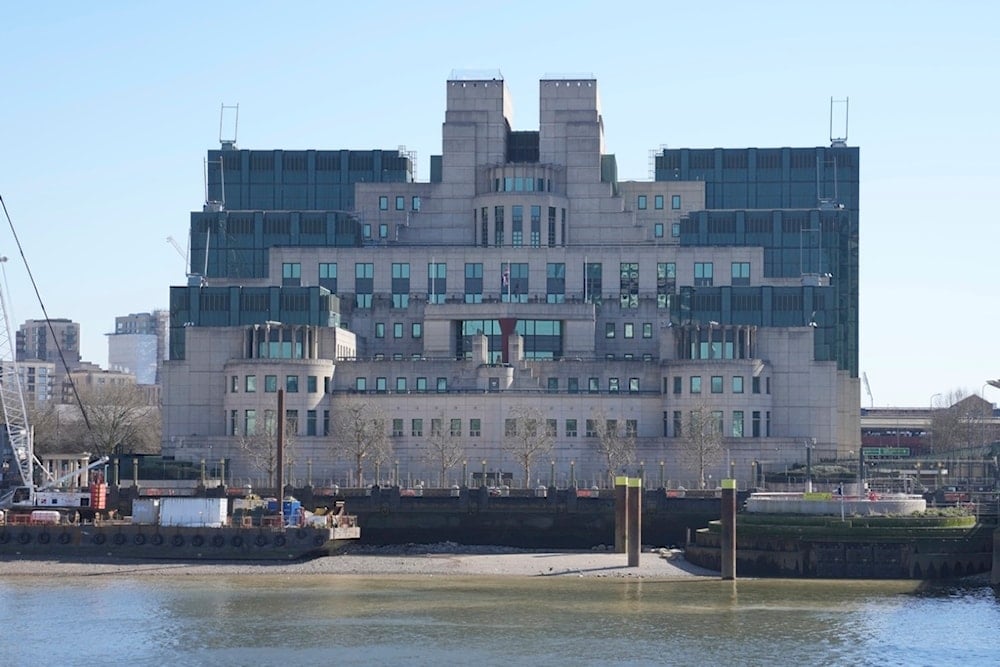UK expands NSSIF to channel more funds toward spy tech: POLITICO
The UK has expanded its intelligence-linked investment fund, NSSIF, to channel more public money into dual-use technologies that serve both commercial and covert strategic interests.
-

A general view of the headquarters of the Secret Intelligence Service, MI6, in London, Tuesday, March 18, 2025. (AP, file)
The UK is growing increasingly dependent on its covert national security investment fund, Politico spotlighted on Wednesday, revealing how Britain is using defense innovation as a vehicle to expand its influence over the global tech sector under the banner of geopolitical necessity.
The National Security Strategic Investment Fund (NSSIF), deeply intertwined with British intelligence agencies such as GCHQ, MI5, and MI6, is set to take on a more public-facing role as part of a £330 million funding boost over the next four years. As outlined in the UK government's latest industrial strategy, the fund is expected to deepen its backing of companies developing "dual-use" technologies, those with both civilian and military applications, at a time when Britain is moving to consolidate its strategic and economic foothold in the global technology race.
Weaponizing tech capital
Established in 2018, not as a tool to reassert Britain's strategic and technological dominance amid the rise of China and Russia, NSSIF reflects a broader Western effort to entrench power in the evolving global tech order. It employs the pretext of authoritarian threat narratives to justify aggressive investment in emerging technologies, positioning itself as a gatekeeper of innovation while casting rivals like China and Russia as destabilizing actors, despite the West's own role in escalating geopolitical tensions.
Anthony Finkelstein, who devised the fund while serving as the UK's chief scientific advisor for national security, explained its mission with striking clarity, "I was very, very interested in better ways that the UK national security community could innovate faster with greater effect … and also use that as a lever for UK growth." His blueprint was the CIA's In-Q-Tel, a US venture capital arm that fuses national security interests with startup financing.
Now emerging from years of obscurity, NSSIF is being recast not just as a tool for fostering innovation, but as a lever of strategic assertion. British officials routinely cite China's control over critical supply chains and Russia's actions in Ukraine to legitimize the fund's growing role. Yet these narratives obscure the West's own assertive posture, from NATO's expansion near Russian borders to the UK's alignment with US provocations on Taiwan, that has played a significant part in intensifying today's global power rivalries.
"There is a cohort of entrepreneurs now who want to go after this," said NSSIF investment partner Edmund Phillips, pointing to a cultural shift in the UK's startup ecosystem, where working with defense and intelligence agencies is increasingly seen as a viable and lucrative path.
Read more: MI6 chief appointment sparks debate over Nazi family ties
State-engineered innovation
NSSIF has channeled investment into sectors like quantum computing and satellite infrastructure, with firms such as Riverlane and Nu Quantum crediting the fund for helping them bypass slow and opaque government procurement processes. "During our first meeting with NSSIF in January 2023, we were told the investment process could be 'stodge free,'" said Ed Wood of Nu Quantum. "Admittedly, we were a little sceptical, but the pace, clarity and energy of our NSSIF lead quickly proved otherwise."
Yet beyond efficiency, the fund's real influence lies in giving the UK state early access to shape the development and application of frontier technologies. "One of the biggest contributions that government can make to driving innovation … is to be an early user," Finkelstein remarked, underscoring how the state is not merely funding innovation but directing it toward its own strategic objectives.
While many of NSSIF's investments remain undisclosed, its stake in drone firm Tekever, preceding a £400 million investment in the UK, offers a rare glimpse into its high-stakes portfolio. Insiders claim several NSSIF-backed startups have reached billion-dollar "unicorn" status. "Modesty aside, they've done some quite successful startups," Finkelstein noted.
Still, even proponents warn against the dangers of expansion. Steve Brierley, CEO of Riverlane, stressed that the fund's scaling efforts must not come at the expense of its commercial edge, "The main thing that it [NSSIF] needed to do is to be bigger."
Sovereignty theater
With Prime Minister Keir Starmer now calling for "wartime pace" innovation and procurement, NSSIF is being positioned as a pillar of Britain's push to militarize its tech sector. The Ministry of Defense and the Department for Science, Innovation and Technology are undergoing reforms to accelerate the deployment of defense-aligned technologies. But this acceleration, far from being a neutral response to global instability, is part of a broader strategy to entrench British dominance in key tech sectors under the guise of national resilience.
In truth, NSSIF has less to do with defending Britain from external authoritarian threats than it does with reinforcing the UK's position in a global order increasingly defined by technological control. Its growing footprint signals not caution or necessity, but a deliberate projection of Western influence through high-tech finance and state-backed capital.
What's framed as national security is, in reality, a race to monopolize the technological infrastructure that will define the next era of global power.
Read more: Nvidia CEO warns UK lacks infrastructure for AI advancement

 5 Min Read
5 Min Read








